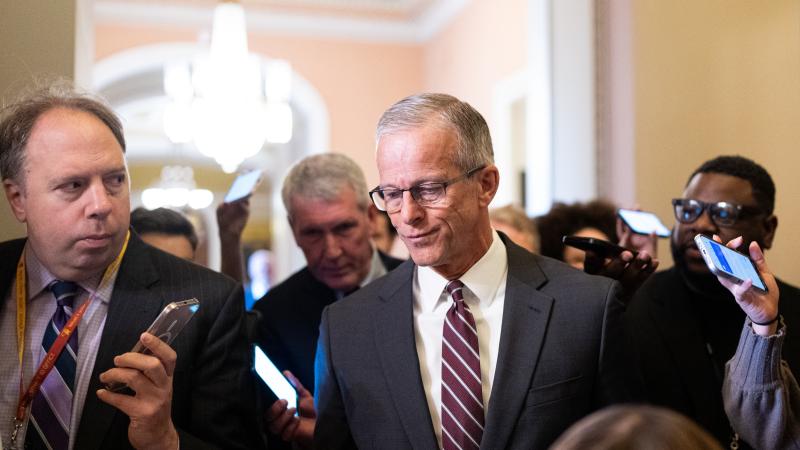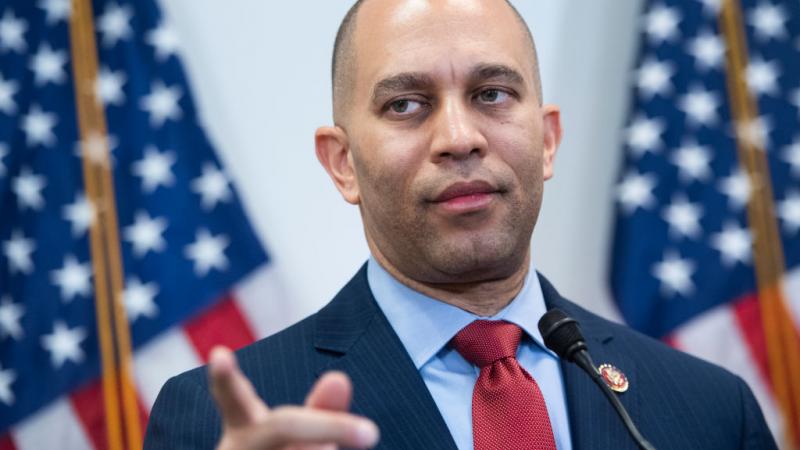Fiscal conservatives' frustration with Mitch McConnell boils over with $1.7T omnibus
Since McConnell started serving as Republican leader in January 2007, the national debt has risen from $9 trillion to $31.3 trillion today.
Frustrations with Senate Republican Leader Mitch McConnell among fiscal conservatives have come to a boiling point with Senate passage of the $1.7 trillion omnibus bill that congressional leaders are rushing to pass before the Christmas holiday during the lame duck session of Congress.
"The bipartisan government funding bill before this body is imperfect but strong," McConnell said on Wednesday. "It will make huge new investments in our Armed Forces while cutting non-defense, non-veterans baseline spending in real dollars."
Many conservative Republican lawmakers, however, argued against passage of such a large spending package after an election which saw the House majority flip to the GOP.
"If there are people in Congress who do care, who do really care about those who are struggling with the burden of inflation, the best way is to quit digging the hole deeper," Kentucky Republican Sen. Rand Paul wrote Wednesday on Twitter. "Quit adding to the debt and begin to balance our budget."
Florida Republican Sen. Rick Scott, who challenged McConnell for the top GOP leadership position in the new Congress but came up short, said he was voting against the $1.7 trillion omnibus bill because it would worsen inflation.
House conservatives have expressed similar views on the spending bill.
"Mitch McConnell," tweeted Georgia Republican Rep. Marjorie Taylor Greene, "is on the verge of giving the Democrats everything they want by working with Chuck Schumer to pass through a $1.7 Trillion Omnibus bill with huge increases in spending and changing the way Congress counts Presidential electoral college votes. R Senators vote NO!"
Texas GOP Rep. Chip Roy directly addressed McConnell on the House floor.
"Do your job, and follow the wishes of the American people who gave a majority to Republicans in the House of Representatives," he said. "And let's stop this bill."
Wisconsin GOP Rep. Tom Tiffany referred to the bill as the "Nightmare Before Christmas" on social media.
House Republican Leader Kevin McCarthy said on Tuesday that any bill sponsored by a GOP senator voting for the omnibus bill would be "dead on arrival" in the House, assuming he is elected speaker in January.
McCarthy told reporters this week that the House GOP was left out of the negotiations over the spending bill. House GOP leaders favored a temporary funding bill expiring in January to give the new, GOP-led House a chance to negotiate a new spending package.
The Senate Republican caucus elected McConnell as Republican whip in 2003. He has gone on to become the longest-serving Senate Republican leader in history. He was first elected to that position in 2006 and formally began his work in that role in January 2007. Since then, the national debt has risen from $9 trillion to $31.3 trillion. Control of the House, Senate and White House flipped back and forth between parties during that period of time, but conservatives note that McConnell was a key negotiator in most of the major spending deals reached between the White House and Congress, which has the power of the purse.
Fiscal conservatives argue that McConnell appears to have thrown in the towel when it comes to reducing spending by supporting the $1.7 trillion omnibus bill filled with earmarks. In the past, McConnell has been tied to earmarks, commonly referred to as pork, for his home state of Kentucky. He later supported a ban on earmarks, but the practice has been resurrected.
According to experts from the Committee for a Responsible Federal Budget, the omnibus raises overall nondefense spending along with a substantial increase to the defense budget over FY2022. The nearly $70 billion hike in the defense budget for fiscal year 2023 is $45 billion over the amount Biden requested in his original budget proposal.
Mollie Hemingway, editor of the Federalist, argued in an opinion piece that the GOP won't be successful until McConnell is no longer the Senate GOP leader.
"Rather than present a coherent and persuasive vision of what Republican control of the Senate might look like, or even demonstrating consistent opposition to Democrat policies, too often McConnell overtly or covertly helped Democrats pass their signature policy goals," she wrote.
Sebastian Gorka, former adviser to former President Trump, said McConnell and other establishment GOP lawmakers are damaging the fiscal health of the nation for future generations.
"It's the drunken sailors on Capitol Hill who are spending our great grandchildren's legacies into oblivion," he told Just the News. "Mitch McConnell is part of that. It's like drunken sailors on steroids who do not care about the consequences of that. Fiscal insanity."
Conservative commentator Monica Crowley credited McConnell for his record on advancing the confirmation of conservative judges but said his fiscal policy record is evidence of his status as an establishment GOP figure in Washington.
"Mitch McConnell is a Republican swamp creature," Crowley, former assistant secretary for public affairs for the U.S. Department of the Treasury, told Just the News. "He's been there for many years. His wife, Elaine Chao, has been a cabinet secretary for a couple of Republican presidents, so they are deeply, deeply entrenched in Washington D.C. and the swamp. They know how the swamp works, and in many ways they lead the swamp. And it is a huge problem."
McConnell's spokesperson did not return a request for comment on fiscal conservatives' frustration with his leadership over the omnibus bill.
The bill passed in the Senate on Thursday with 50 votes from Democrats and 18 votes from Republicans. There were 3 GOP senators not voting.















